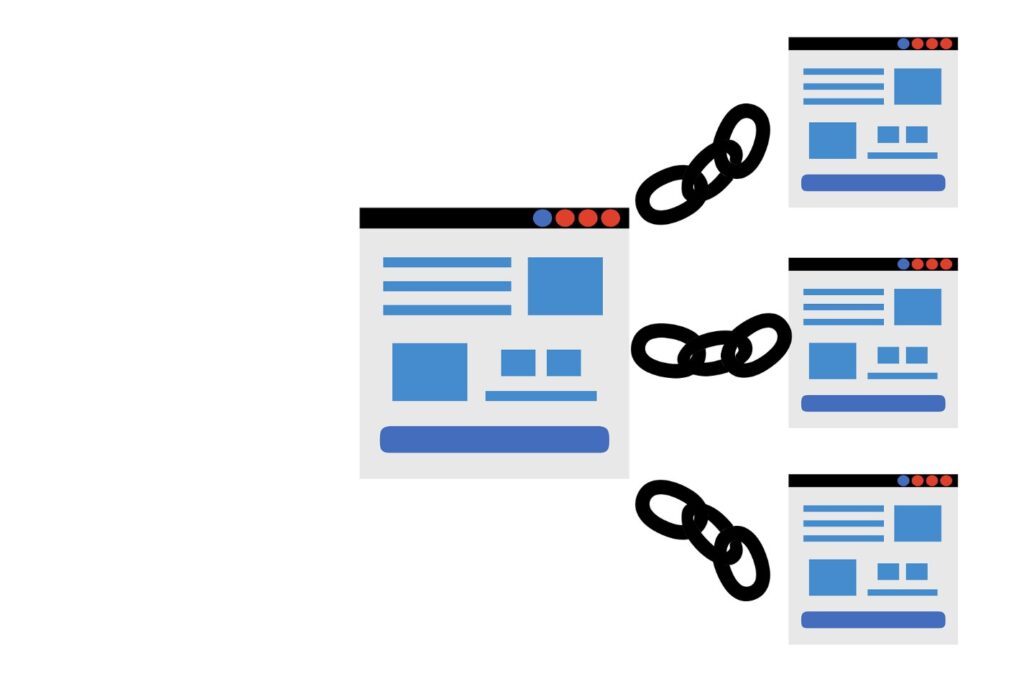Types of Backlinks

Types of Backlinks There are several different types of SEO backlinks. And understanding the different kinds can help you craft a link building strategy. Follow Links Follow links are hyperlinks without any additional attributes—standard hyperlinks, in other words. A follow link tells Google to pass trust and authority to the site being linked to. Note: There is no “follow” link attribute because any link is considered “dofollow” unless an attribute is added. A follow backlink looks like this in HTML code: <a href=”https://www.domain.com/”>this is a follow link</a> Nofollow Links If you link to a site, you are essentially vouching for it (and using a follow link by default). But in some cases, you may not want to do that. For example, you may need to link to a competitor’s page for context but don’t want to necessarily pass them any authority. Or say you want to link to a site as an example in your content. Nofollow links use the rel=”nofollow” attribute to inform Google and other search engines that they shouldn’t pass authority. A nofollow backlink looks like this in HTML: <a href=”https://www.domain.com/” rel=”nofollow”>this is a nofollow link</a> Keep in mind that Google treats the nofollow attribute as a hint, though. So Google will ultimately decide whether or not to pass authority through that link. Sponsored or Paid Links If money, a product, or a service has been provided in exchange for a link, the rel=“sponsored” link attribute should be added. Like this: <a href=”https://www.domain.com/” rel=”sponsored”>this is a sponsored link</a> This attribute helps Google identify promotional links. UGC Links User-generated content (UGC) links let Google know which links were created by users or customers. This allows webmasters to specify that they don’t editorially endorse specific links on their sites. Examples include links in forum posts and blog post comments. UGC backlinks look like this: <a href=”https://www.domain.com/” rel=”ugc”>this is a UGC link</a> Editorially Placed Links Editorially placed links are links you earned naturally, without asking. Let’s say a website links to your blog post about backlinks because they think it’s a good resource. This would be an editorially placed link. Google values these links because they’re meant to enhance a user’s experience rather than manipulate search engine algorithms. Link Schemes Link schemes (or link spam) refer to links intended to “manipulate rankings in Google Search results.” Some examples include: Participating in link schemes may result in a Google penalty. Which can negatively impact your rankings. If you have participated in a link scheme in the past, you should disavow potentially harmful backlinks. This means asking Google to ignore certain links to your site. Important note: Google recommends that you only disavow links if you have paid for links or participated in a link scheme of any kind. Google is good at ignoring spammy links you can’t control. Otherwise, you can harm your site’s performance. Post By Thamiris Campos
Why Are Backlinks Important for SEO?

Why Are Backlinks Important for SEO? Backlinks can: Let’s get into the details. They Can Improve Rankings Google considers backlinks one of the most important signals for ranking content. Because Google views external links as votes of popularity for a website or webpage, there is a strong correlation between sites with lots of quality backlinks and higher rankings. You can have tons of backlinks from spammy, low-quality websites. But they probably won’t be as impactful as a few backlinks from authoritative sites that are relevant to your business. Think about it this way: If your website is about food, would you trust a link from your co-worker’s recreational pizza blog more than a link from the Culinary Institute of America? Probably not. Let’s take Semrush for example. Adobe, the multinational software company, links to Semrush from their website. Adobe has a high Authority Score (AS). That’s Semrush’s metric for measuring a domain or webpage’s overall quality. And getting links from authoritative sites boosts the trustworthiness and credibility of your own site. Using the Backlink Analytics tool, you can check the Authority Score of any website that links to you. The referring domain, adobe.com, has an Authority Score of 91: Pro tip: Also pay attention to your referring domains—the number of domains that link to you. Having varied backlinks from many different sites shows that you’re trustworthy. So backlinks are great for SEO. And backlinks are also beneficial when key publications in your industry link to you and acknowledge you. Think of it as word of mouth. You’re probably more likely to trust a business that several of your trusted friends have recommended to you. In short, getting backlinks for SEO purposes is great. But they also build your credibility within your niche.
What is Link Building?

What is Link Building? Link building is the practice of obtaining external links that point to your website. In SEO, these links are called backlinks. Getting backlinks from high-quality domains can build authority for your site, as well as help it to rank higher on search engine results pages (SERPs). According to Google, one of the most important factors in determining which pages are truly relevant and credible is “checking to see if other relevant sites link to or refer to the content.” Therefore, it is important to consider link building when creating your SEO strategy. Why is Link Building important? Let’s say you have great content, but your site is new and hasn’t gained much authority yet. Getting links from other trusted sites is a great way to help Google understand your site as a trusted source of information. Backlinks are essentially votes of confidence for your website. Since pages with more backlinks generally rank higher, it’s critical: 1. Create high quality content; 2. Use link building strategies to actively get more backlinks. Since this takes effort, starting the link building process earlier will give you a greater advantage over your competitors and will yield excellent benefits in the long run. How does Link Building work? The best way to increase your authority through link building strategies is to get backlinks from high-quality, credible websites. If you have a lot of backlinks, but they are from sites that are considered irrelevant and spammy, this will not help your site rank better. There are many ways to acquire quality backlinks such as: • Guest post; • Disclosure on social networks; • Outreach; • Getting backlinks from competitors. Remember that backlinks don’t work in isolation; they should be part of a holistic SEO strategy – and first and foremost, you should focus on creating high-quality, useful content. Harnessing the full potential of link building can be a challenge for beginners and seasoned professionals alike. However, this can be one of your most powerful tools for your website’s organic success.

